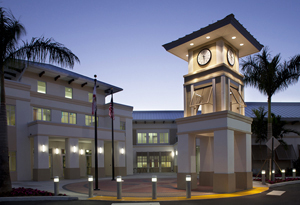On Wednesday, March 13, Wellington’s Planning, Zoning & Adjustment Board held a public hearing and unanimously approved a nightclub ordinance that would effectively grandfather-in up to 16 such businesses.
The measure, which has been approved by the village’s Equestrian Preserve Committee and the Public Safety Committee, defines what a “nightclub” is and calls for added security at those establishments. It now goes to the Wellington Village Council for final approval.
PZA Board Chair Elizabeth Mariaca said that the board’s limited meeting schedule recently does not show the importance of the work it does. “This one item on the agenda is of great significance and importance,” she said, explaining that it could be lifesaving.
Planning, Zoning & Building Director Bob Basehart drafted the ordinance. “It is designed to prevent and deter situations at businesses that are deemed to be nightclubs that could cause problems,” he said.
Basehart explained that Wellington is not alone in problems with traffic accidents, underage drinking, parking lot damage, vandalism, intoxicated patrons leaving to drive and traffic deaths due to drunk driving.
“It seems like every year there is one here and others throughout the county,” Basehart said.
The ongoing Palm Beach County Sheriff’s Office initiative Wild Stallion has stepped up enforcement during the equestrian season, with officers and agents visiting establishments looking for underage drinking and people who have had too much to drink.
The PBSO asked the village to adopt an ordinance regarding nightclubs, similar to the Palm Beach County ordinance, and Basehart used the county’s as a model.
“We created a list of businesses that might be affected,” he said, explaining that there are 67 establishments with a license to sell alcohol in Wellington, and that 16 could possibly be considered a nightclub.
These businesses may function as a restaurant or cocktail lounge during part of the day. He pointed out that despite the name, a nightclub doesn’t operate only at night.
Basehart added that if an establishment collects a cover charge and sells alcohol, it is deemed to be a nightclub. A letter was sent out to the 16 potential nightclubs detailing the new ordinance and requesting they call him with any questions or comments.
“I received two calls asking questions,” said Basehart, who remarked that one wouldn’t leave a name. “So, establishments that could be affected by this have been notified and given good notice.”
There were no members of the public at the meeting to offer comments.
Basehart pointed out that the three elements of the ordinance were the clarification of the definition of a restaurant, a cocktail lounge and the addition of a definition of a nightclub.
“If you are under 21, you cannot go into a nightclub,” Basehart explained, adding that there are exemptions for employees and military personnel.
Basehart continued that people in the equestrian district with a special-use permit are exempt from the ordinance, but they can only function as a nightclub while the equestrian event is going on, and that all new nightclubs will need to be approved, while the 16 existing potential nightclub establishments are grandfathered-in.
Basehart clarified that weddings and birthday parties, or events requiring a ticket and serving alcohol, aren’t nightclubs, as they are not continually operating commercial businesses.
Additionally, there is no financial requirement for the new classification. “There is no annual fee or charge, but new nightclubs will go through planning and zoning,” he said.
Security is the key measure in the new ordinance.
While a nightclub can request that security be waived if it has no incidents or calls to the PBSO, security is required at nightclubs and will be in the ratio of one officer for every 150-seating capacity.
This security must be in the form of off-duty law enforcement officers or private state-licensed and certified security personnel with a Class D security license.
There was some discussion if private security was enough or if it needed to be off-duty officers because security can’t stop an intoxicated driver.
Village Attorney Laurie Cohen did not think the classification would change the situation. “As a practical matter, even an off-duty PBSO officer would not leave their off-duty position to arrest an intoxicated driver and book them,” she said. “They would call for [an on-duty] PBSO officer and have them there in a couple of minutes.”
Whether the establishment could have its own security was discussed, and Cohen said that they could if their own security personnel had the Class D license. “If a busboy has a security license, they could draft him into service, but he’d probably want a raise,” she said.








